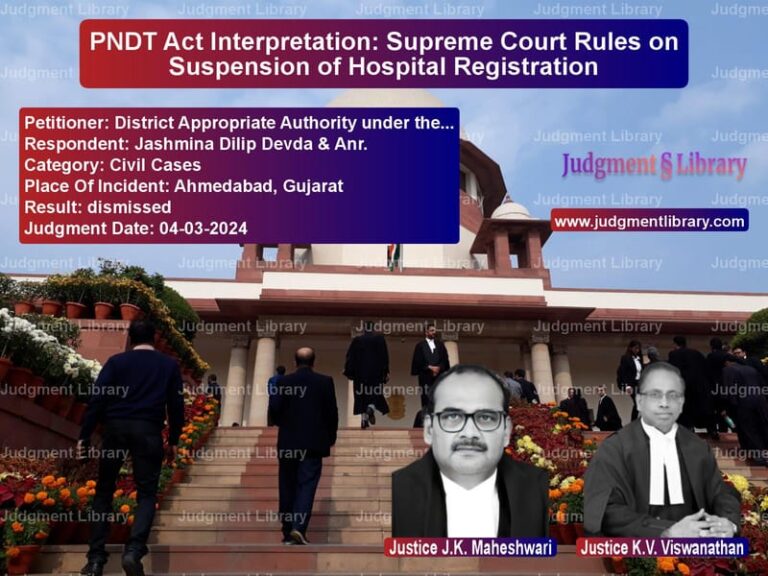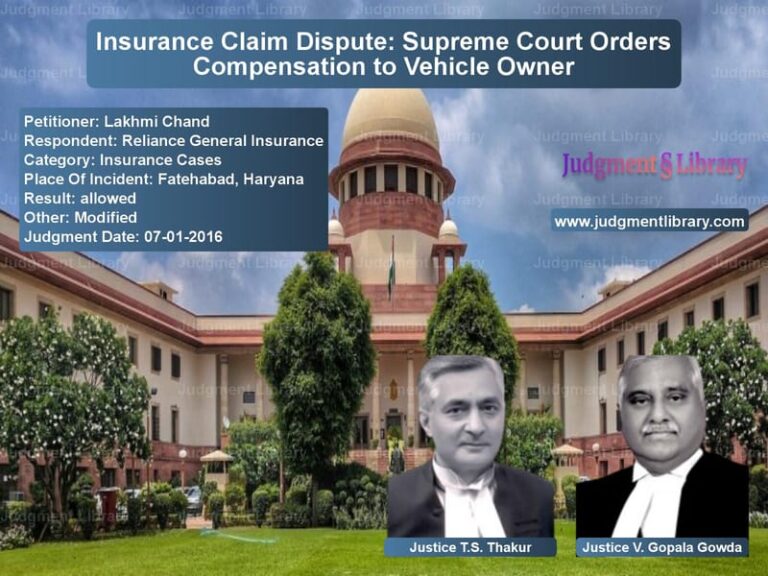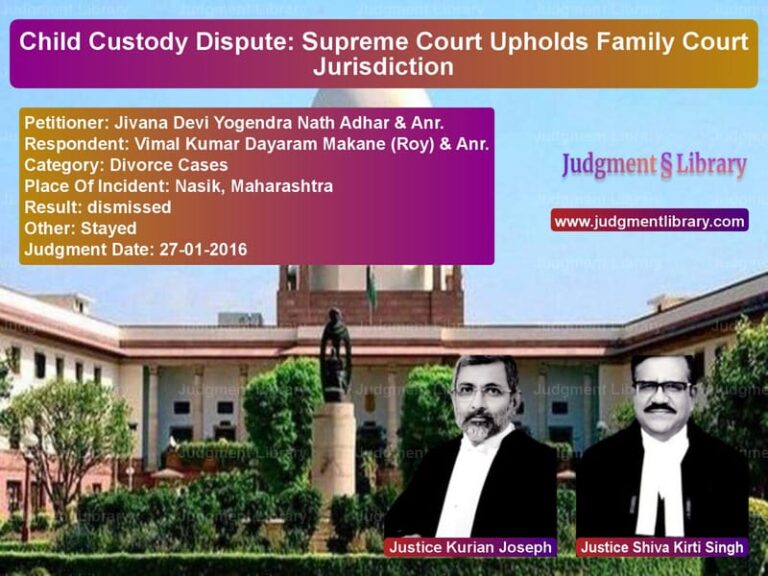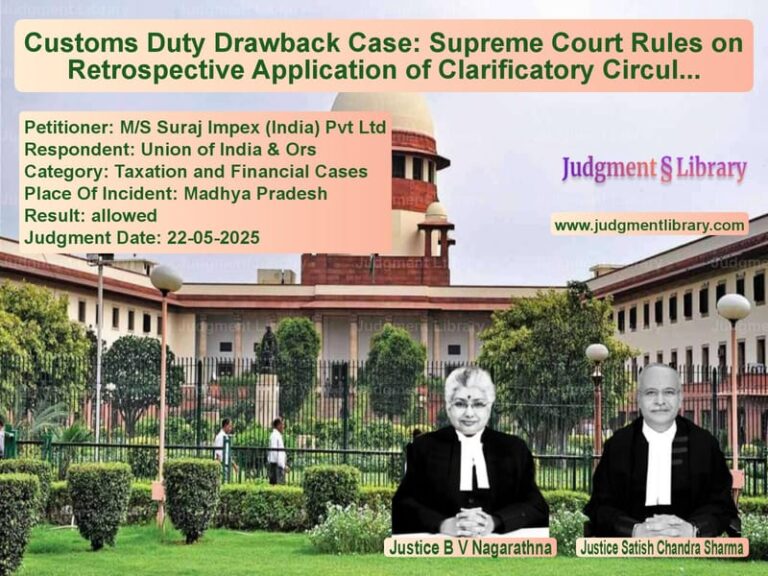Supreme Court Partially Overturns Acquittal in Rajasthan Murder Case
The Supreme Court of India, in its judgment dated 24 November 2021, partially overturned the acquittal of several accused individuals in a brutal murder case from Rajasthan. The case, State of Rajasthan vs. Bablu @ Om Prakash & Ors., stemmed from a violent attack on 8 March 2012, where a group of armed men stormed the house of the victim, Dhanpal, and fatally assaulted him. The trial court had convicted 13 individuals, but the Rajasthan High Court later acquitted 11 of them, leaving only two convictions intact. The Supreme Court reviewed the case and reinstated the convictions of six accused, emphasizing the reliability of the eyewitness testimony.
Background of the Case
On the day of Holi in 2012, a group of 20-25 men armed with swords, rods, and other weapons entered the house of the complainant, Sunil (PW1). The attackers allegedly targeted Dhanpal, dragging him outside and continuing their assault in front of a Gurudwara. Sunil and several other witnesses sustained injuries while attempting to intervene. Dhanpal succumbed to his injuries the next day.
The prosecution argued that the attack was premeditated and linked to an earlier incident four days prior, in which members of the victim’s family had allegedly attacked some of the accused. The trial court convicted all 13 accused under Sections 147, 148, 149, 450, 302, and 307 of the Indian Penal Code (IPC). However, the High Court later overturned the convictions of 11 individuals, citing lack of direct evidence and possible over-implication.
Arguments by the Prosecution
The prosecution, represented by the State of Rajasthan, argued that:
- Multiple eyewitnesses, including Sunil (PW1), Madanpal (PW2), Narayan (PW6), Prakash (PW24), Roop Singh (PW25), and Tulsiram (PW27), provided consistent accounts of the attack.
- Medical evidence confirmed that Dhanpal died from head injuries inflicted by sharp and blunt weapons.
- The High Court erred in dismissing the role of the accused despite clear evidence of their participation in the unlawful assembly.
- Evidence on record, including the recovery of weapons, supported the trial court’s conviction.
Arguments by the Respondents
The defense contended:
- The prosecution witnesses were biased due to previous enmity between the parties.
- The High Court rightly noted that the prosecution failed to assign specific roles to most of the accused.
- Several accused were not named in the FIR or were added later during the investigation.
- Previous enmity led to over-implication of many accused who had no direct involvement.
Supreme Court’s Observations
The Supreme Court bench, comprising Uday Umesh Lalit and Ajay Rastogi, examined the reliability of the prosecution witnesses and noted:
- Eyewitnesses provided detailed and consistent accounts of the crime.
- The High Court failed to provide justifiable reasons for disbelieving the testimonies of key witnesses.
- The trial court had correctly analyzed the evidence before convicting the accused.
- While over-implication was possible, at least six of the acquitted accused were clearly identified as active participants.
Key Supreme Court Rulings Cited
The Court referred to the following landmark judgments:
- Masalti v. State of U.P. (1964) – Highlighting the reliability of multiple eyewitnesses in mob violence cases.
- State of Maharashtra v. Ramlal Devappa Rathod (2015) – Discussing the liability of members of an unlawful assembly.
- State of U.P. v. Kishanpal (2008) – Reinforcing the principle that reliable eyewitness testimony cannot be discarded without strong reasons.
Final Judgment
The Supreme Court ruled as follows:
- The acquittal of six individuals—Radhey Shyam (A1), Jeetu (A6), Ghan Shyam (A7), Rajendra (A8), Sattu (A10), and Ranjeet (A13)—was set aside.
- Their conviction under Sections 147, 148, 450, 302, and 307 IPC was reinstated.
- These six accused were ordered to surrender within four weeks to serve their sentences.
- The acquittal of the remaining accused was upheld due to lack of specific evidence.
- The order was forwarded to the concerned police stations for execution.
Implications of the Judgment
This ruling has significant implications for criminal law in India:
- Strengthening Eyewitness Testimony: The judgment reinforces that credible and consistent witness accounts must be given due weight.
- Correcting High Court Errors: The Supreme Court clarified that appellate courts must provide clear reasons when overturning trial court convictions.
- Accountability in Mob Violence Cases: The ruling discourages large-scale assaults by ensuring that all active participants in an unlawful assembly are held accountable.
- Guidance on Over-Implication: The Court acknowledged that over-implication is possible in mob cases but emphasized the importance of case-by-case evaluation.
The Supreme Court’s judgment in State of Rajasthan vs. Bablu @ Om Prakash & Ors. reinforces the rule of law by ensuring that justice is served while preventing wrongful convictions.
Petitioner Name: State of Rajasthan.Respondent Name: Bablu @ Om Prakash & Ors..Judgment By: Justice Uday Umesh Lalit, Justice Ajay Rastogi.Place Of Incident: Rajasthan.Judgment Date: 24-11-2021.
Don’t miss out on the full details! Download the complete judgment in PDF format below and gain valuable insights instantly!
Download Judgment: state-of-rajasthan-vs-bablu-@-om-prakash-&-supreme-court-of-india-judgment-dated-24-11-2021.pdf
Directly Download Judgment: Directly download this Judgment
See all petitions in Murder Cases
See all petitions in Bail and Anticipatory Bail
See all petitions in Judgment by Uday Umesh Lalit
See all petitions in Judgment by Ajay Rastogi
See all petitions in partially allowed
See all petitions in Remanded
See all petitions in supreme court of India judgments November 2021
See all petitions in 2021 judgments
See all posts in Criminal Cases Category
See all allowed petitions in Criminal Cases Category
See all Dismissed petitions in Criminal Cases Category
See all partially allowed petitions in Criminal Cases Category







